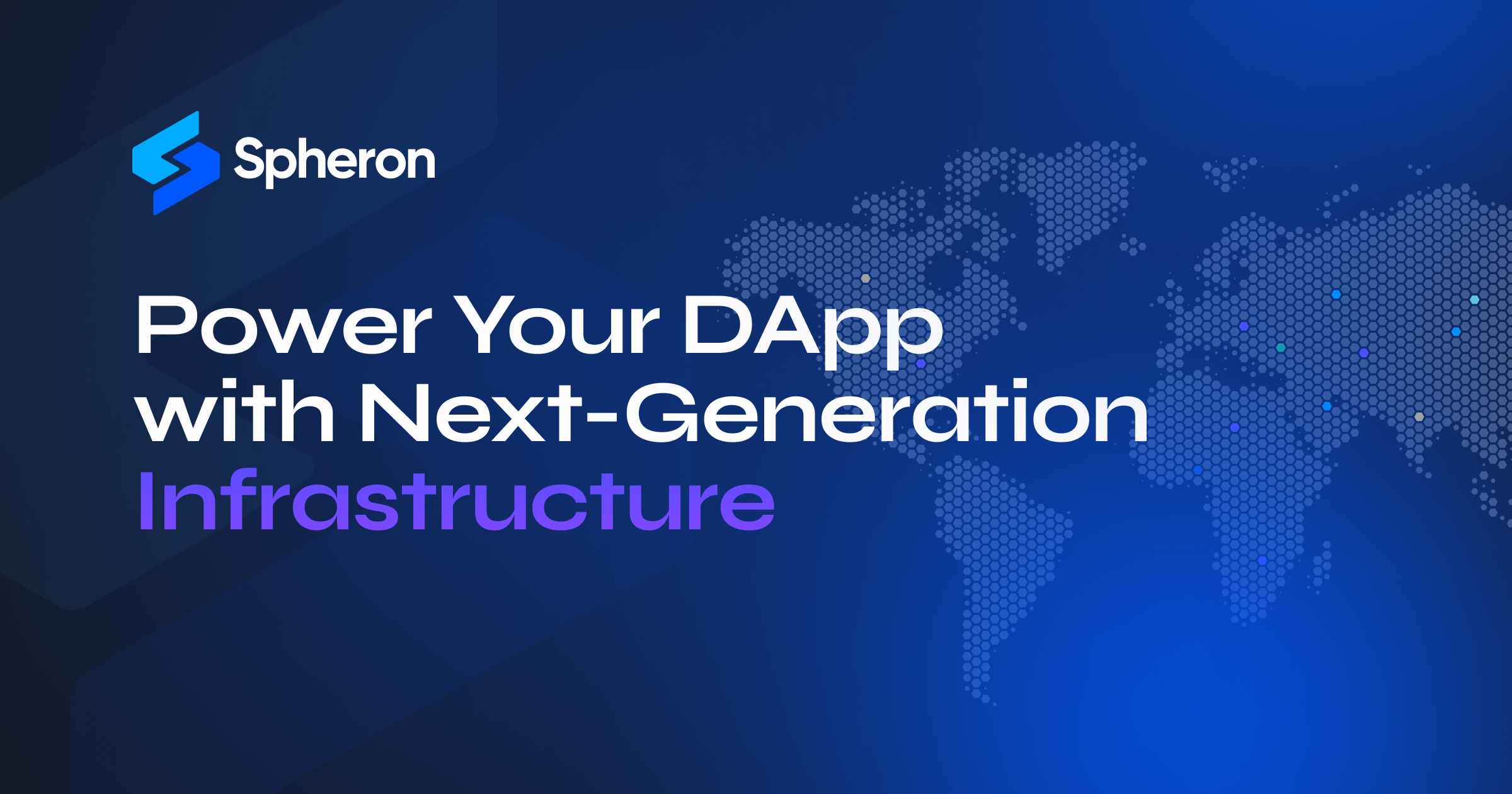Unlocking dApp Potential: A Guide to Spheron Storage SDK Integration
 Anmol Sirola
Anmol Sirola
I. Introduction
In the rapidly changing digital world, the need for secure and dependable storage solutions has become increasingly vital. Traditional centralized storage systems, which store data on servers controlled by a single entity, have inherent limitations, such as susceptibility to cyberattacks, restricted scalability, and ongoing hosting fees.
Decentralized storage offers a transformative approach to data storage and management. By distributing data across a network of nodes, it removes reliance on a single entity, improving security, reliability, and scalability. Decentralized storage ensures data redundancy and accessibility by replicating data across numerous nodes, even if some nodes become unavailable.
The Spheron Storage SDK is an effective tool that facilitates the smooth integration of decentralized storage into your dApps or applications. It provides developers with an efficient method to harness the benefits of decentralized storage, offering a streamlined interface for storing and retrieving data on a decentralized network without the typical complexities.
II. Understanding the Spheron Storage SDK
The Spheron Storage SDK simplifies decentralized storage integration for dApps and applications. Built on the Spheron Network, it employs various protocols to ensure data security and reliability.
Featuring a user-friendly API, the SDK abstracts the complexities of decentralized storage, allowing developers to focus on application logic. It utilizes protocols to replicate data across multiple nodes, ensuring high availability. Built-in encryption mechanisms protect data, and access control features enable developers to establish permissions for data access and modification.
The SDK provides several features that make it easy for developers to integrate decentralized storage into their applications, including:
A simple and easy-to-use API
Support for a variety of decentralized storage protocols
Automatic replication of data across multiple nodes
Data encryption
Access control
III. Benefits of Using the Spheron Storage SDK
Decentralized storage offers numerous benefits for dApps and applications, and the Spheron Storage SDK makes these advantages more accessible.
Security: Decentralized storage distributes data across a network of nodes, enhancing security compared to traditional centralized storage. The Spheron Storage SDK further bolsters security with inbuilt encryption mechanisms, ensuring data confidentiality and integrity. By removing a single point of failure, it reduces the risk of cyberattacks and data breaches.
Data Permanence: Centralized storage solutions may experience data loss or service disruptions, whereas decentralized storage ensures greater data permanence. The Spheron Storage SDK utilizes replication across multiple nodes for redundancy and availability. Even if some nodes become unavailable, data can still be accessed from other nodes, providing high data durability.
Scalability: As dApps and applications expand, so do their storage needs. The Spheron Storage SDK enables effortless scaling of storage capacity. Developers can easily scale their applications without worrying about infrastructure constraints or performance bottlenecks, as the storage network is designed to accommodate increasing demands.
Cost-effectiveness: Traditional centralized storage solutions often incur recurring hosting fees that accumulate over time. Decentralized storage presents a more economical approach. By implementing the Spheron Storage SDK, developers can take advantage of the decentralized network without additional hosting costs, making it a budget-friendly choice for long-term storage requirements.
Compatibility: The SDK is designed for compatibility with various programming languages and platforms, enabling developers to integrate decentralized storage into their projects regardless of their technology stack. Comprehensive guides and examples in the SDK's documentation make it easy for developers to get started.
IV. Integrating the Spheron Storage SDK into our Dapp
Integrating the Spheron Storage SDK into your dApp or application is a straightforward process. Follow these step-by-step instructions to get started:
Prerequisites and Installation: Before integrating the SDK, ensure that you have the necessary prerequisites in place. This may include a specific programming language or development framework. Once the prerequisites are met, you can proceed with the installation of the Spheron Storage SDK. The SDK documentation provides detailed instructions for various platforms and languages.
// Example: Installing the Spheron Storage SDK using npm (Node.js) $ npm install spheron-storage-sdkCreating a Spheron Account and Obtaining an API Key: To use the Spheron Storage SDK, you'll need to create an account on the Spheron platform. This account will provide you with an API key, which is required to authenticate your requests and access the decentralized storage network. Register for an account on the Spheron website and obtain your API key.
// Example: Obtaining the API key from the Spheron account const apiKey = 'your-api-key';Configuring the SDK: With the SDK installed and your API key in hand, it's time to configure the Spheron Storage SDK within your dApp or application. This typically involves setting up the SDK with your API key, specifying any required parameters, and establishing the connection to the decentralized storage network. Refer to the SDK documentation for specific instructions on configuring the SDK based on your development environment.
javascriptCopy code// Example: Configuring the Spheron Storage SDK const SpheronSDK = require('spheron-storage-sdk'); const sdk = new SpheronSDK(apiKey); // Additional configuration options // sdk.setEndpoint('https://spheron-storage-api.com'); // sdk.setNetwork('mainnet');Storing and Retrieving Data: Once the SDK is properly configured, you can start storing and retrieving data from the decentralized storage network. Utilize the SDK's provided APIs to interact with the storage network, allowing you to store files, retrieve them when needed, and manage data access control. The SDK documentation offers detailed examples and code snippets to guide you through these operations.
javascriptCopy code// Example: Storing data using the Spheron Storage SDK const data = 'Hello, Spheron!'; sdk.store(data) .then((cid) => { console.log('Data stored successfully. Content ID:', cid); }) .catch((error) => { console.error('Error storing data:', error); }); // Example: Retrieving data using the Spheron Storage SDK const cid = 'your-content-id'; sdk.retrieve(cid) .then((data) => { console.log('Data retrieved successfully:', data); }) .catch((error) => { console.error('Error retrieving data:', error); })V. Best Practices and Examples
To make the most of the Spheron Storage SDK in your dApp or application development, consider the following best practices:
Data Encryption: Implement strong encryption mechanisms when storing sensitive data on the decentralized storage network. Utilize encryption libraries or functions provided by your programming language or framework to ensure data privacy and protection. For example, a healthcare application can securely store patient records on a decentralized network, ensuring data confidentiality.
javascriptCopy code// Example: Encrypting data before storing using the Spheron Storage SDK const data = 'Hello, Spheron!'; const encryptedData = encrypt(data, encryptionKey); sdk.store(encryptedData) .then((cid) => { console.log('Encrypted data stored successfully. Content ID:', cid); }) .catch((error) => { console.error('Error storing encrypted data:', error); });Access Control: Implement access control mechanisms to restrict data access to authorized users or roles. Leverage the access control features provided by the Spheron Storage SDK to define permissions and enforce data access policies. A project management application could use this feature to restrict access to certain files or documents based on user roles and permissions.
javascriptCopy code// Example: Setting access control permissions using the Spheron Storage SDK const cid = 'your-content-id'; const permissions = { read: ['user1', 'user2'], write: ['user1'], }; sdk.setAccessControl(cid, permissions) .then(() => { console.log('Access control permissions set successfully.'); }) .catch((error) => { console.error('Error setting access control permissions:', error); });Usage Monitoring: Monitor your storage usage to ensure you stay within the allocated storage limits. Regularly check storage metrics provided by the Spheron platform to identify any potential storage overages and take necessary actions. An e-commerce platform can use this feature to monitor the storage of product images and other assets, ensuring optimal usage.
javascriptCopy code// Example: Checking storage usage using the Spheron Storage SDK sdk.getStorageUsage() .then((usage) => { console.log('Storage usage:', usage); }) .catch((error) => { console.error('Error checking storage usage:', error); });Backup and Archiving: Enterprises can use the Spheron Storage SDK to create a decentralized backup and archiving solution for their critical data. By replicating data across multiple nodes.
The Spheron Storage SDK offers a range of additional features and customization options that you can explore in the SDK documentation. This includes advanced search capabilities, metadata management, and event-based triggers, allowing you to build robust and feature-rich decentralized storage solutions.
VI. Conclusion
In conclusion, this article delved into the significance of decentralized storage and its integration into contemporary applications, presenting the Spheron Storage SDK as an efficient tool for incorporating decentralized storage. With its user-friendly API and support for multiple protocols, the SDK offers valuable features such as data replication, encryption, and access control, making it a prime choice for developers seeking the advantages of decentralized storage. By leveraging the Spheron Storage SDK, you can bolster the security, reliability, scalability, and cost-effectiveness of your applications, while ensuring robust data permanence.
Dive deeper into the SDK and incorporate it into your projects, leveraging the comprehensive documentation and code examples provided by Spheron to start quickly and effectively. Embrace the decentralized future and elevate your applications with the Spheron Storage SDK.
You can learn more about Spheron SDK from here: https://www.npmjs.com/package/@spheron/storage?activeTab=readme
Subscribe to my newsletter
Read articles from Anmol Sirola directly inside your inbox. Subscribe to the newsletter, and don't miss out.
Written by

Anmol Sirola
Anmol Sirola
Blockchain developer and hackathon enthusiast with a passion for technical writing and prompt engineering. Actively contributing to open source projects to help shape the future of decentralized technology.